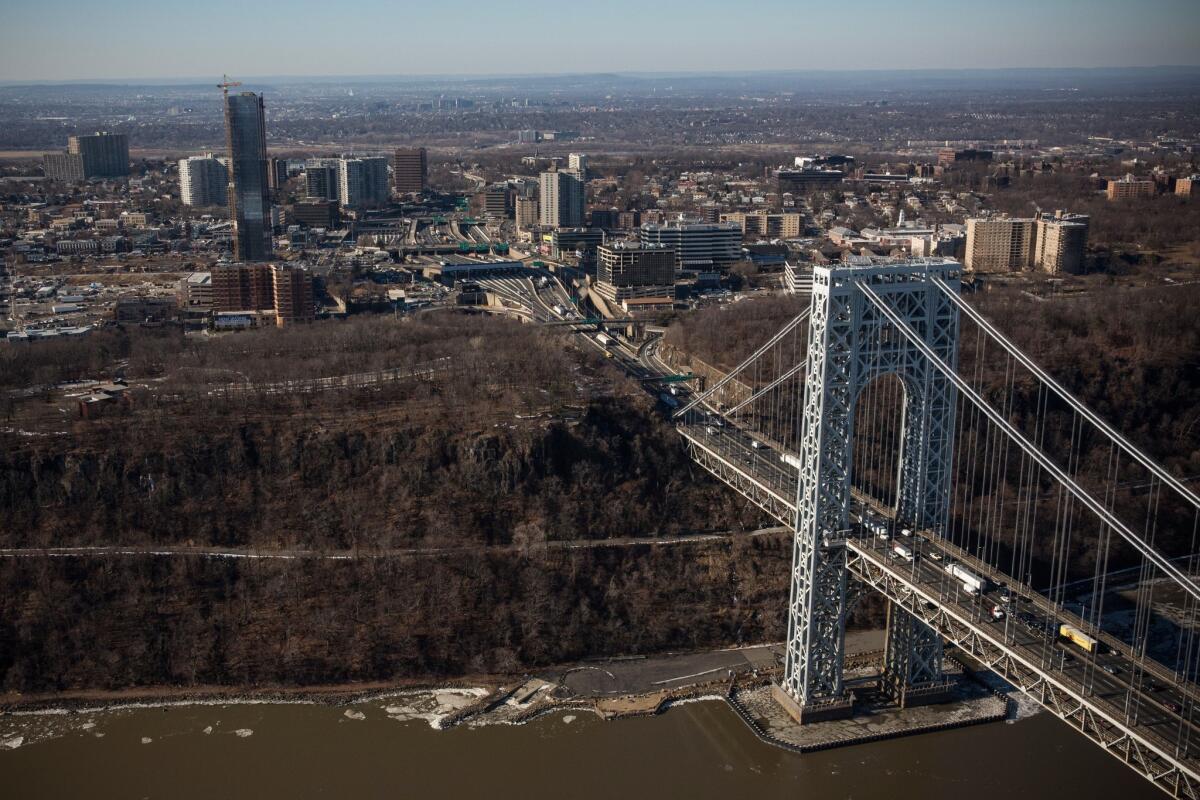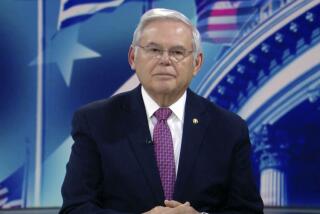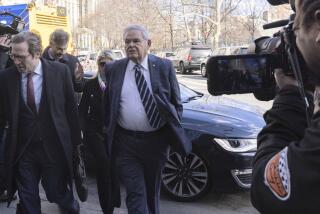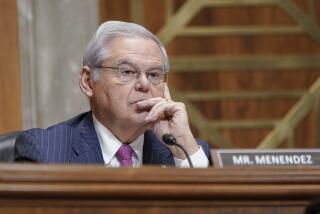Chris Christie lawyers clear him, blame aides in bridge dispute

Lawyers hired by New Jersey Gov. Chris Christie have cleared him of wrongdoing in the massive traffic jam at the foot of the George Washington Bridge, concluding that it was just one more “crazy idea” by one of Christie’s loyalists, motivated by a deep and mysterious grudge against a Democratic mayor.
The report, immediately dismissed by Democrats as an attempt to extricate Christie from a political jam, had some fresh revelations: It said David Wildstein, who ordered the four-day closure of bridge access roads in Fort Lee, claimed to other aides last year that he told Christie about the traffic problems while they were happening; the governor has insisted he never found out until after they were over.
But the report concluded that Wildstein’s story wasn’t credible, and laid nearly all the blame on just two people: Wildstein, a longtime Christie associate who had a political job at the bridge authority, and Bridget Anne Kelly, Christie’s deputy chief of staff at the time.
“There is not a shred of hard evidence that the governor did anything other than what he has publicly said,” said Randy Mastro, the former federal prosecutor who headed the team.
The report, said to have cost taxpayers $1 million, did little to settle the controversy. John Wisniewski, the Democratic state assemblyman co-chairing a state investigative committee looking into the bridge case, said “it reads more like a novel than a work of fact” and left too many questions unresolved. (The U.S. attorney’s office in New Jersey, which Christie once headed, also is conducting an investigation.)
In a statement, the Democratic National Committee called it “an expensive sham.”
“There was no real evidence, no real findings, no real answers, and definitely no exoneration,” said a statement by DNC spokesman Mo Elleithee.
In an interview aired Thursday night on ABC, Christie told anchor Diane Sawyer that he did not believe the bridge closure was engineered to try to please him, and he said he does not believe his often-blunt style created a culture in which staffers thought it was acceptable to punish political enemies.
“I can’t get into what their motivations were, except to say that anybody who really knows me would not believe that doing something inexplicably stupid would please me,” he said.
He also said that Wildstein was “one of hundreds” of people that he spoke to during the Sept. 11 memorial ceremonies in Manhattan, at which Wildstein said he had alerted Christie to the traffic jam.
“I don’t have any recollection of him saying anything. But I’ll tell you this. I’ll tell you what he didn’t say. He didn’t say, ‘Hey, by the way governor, I’m closing down some lanes of the George Washington Bridge to stick it to the mayor. Is that OK?’ That I’d remember.”
With the additional investigations ongoing, the release of Thursday’s report did little to clarify Christie’s political future, wounded by the months-long conversation about traffic jams and insinuations of bullying. When the controversy began in earnest late last year, Christie -- fresh off a landslide reelection victory in November -- was looking toward a potential presidential bid in 2016, Now, the governor’s once sky-high popularity in New Jersey has plummeted and during national forays for his role as head of the Republican Governors Assn., he has been dogged by critics. The Sawyer interview was a rare occasion in which he willingly discussed the matter.
Mastro said his team pored over thousands of documents and interviewed 70 witnesses, but heard nothing from the central players in the drama like Wildstein, Kelly and former campaign manager Bill Stepien, who have cited the 5th Amendment in fighting subpoenas for their documents sought for the other investigations underway. Also refusing to speak to Mastro’s team was David Samson, a close Christie ally and the chairman of the Port Authority of New York and New Jersey, which runs the area’s bridges.
The report said Mastro’s team found abundant evidence that Kelly and Wildstein were motivated by hostility toward Mark Sokolich, the Democratic mayor of Fort Lee. The report also revealed that the day before she sent Wildstein the notorious email, “Time for some traffic problems in Fort Lee,” Kelly checked with one of her staffers to confirm that Sokolich was not endorsing Christie.
But Mastro said the reason for the animus wasn’t clear and that the theory that it was retaliation for the mayor’s failure to endorse Christie makes little sense.
Christie’s staff talked to Sokolich about the endorsement early in the year but knew by March that he was not planning to endorse the mayor. Even after that, Sokolich thought he had good relations with the governor, the report said.
“It was Wildstein’s ‘idea,’ like so many other ‘crazy’ ones he’d had before that never got off the ground,” the report said. It said that the issue of the local access lanes had come up before at the Port Authority -- some thought that the usual pattern unfairly delayed other drivers -- but that Wildstein apparently took a special interest.
Stepien once told the governor that Wildstein would come to him with “50 crazy ideas a week,” the report said.
As the controversy around the lane closures grew, Wildstein tried to deflect blame, the report said. Over dinner last December, Wildstein told Christie press secretary Michael Drewniak that Kelly and Stepien knew about the closures -- and that he told Christie about the traffic problems while they were happening, when they both attended the Sept. 11 memorial service.
But Christie told the attorneys he didn’t remember the conversation and he would have paid no attention to news of a traffic jam. Christie said he knew of no plot to punish Sokolich.
The report says that Stepien and Kelly dated briefly last year, after Stepien left the governor’s office to run the campaign, but then mostly stopped speaking -- creating some communication problems around the time of the bridge closures. Stepien’s lawyer, Kevin Marino, slammed what he called the “gratuitous” reference to the brief romance and said the report confirms that Stepien did nothing wrong; it concluded he knew of the traffic plan but not Wildstein’s ulterior motive.
Marino characterized Wildstein as trying to impress the more important figures on Christie’s team. He implied that it was a repeat of their earlier relationship; at Livingston High School, Christie was a star on the baseball team, while Wildstein served as a statistician.
“He was the kid at the end of the bench trying with all his might to get into the lineup,” Marino said of Wildstein.
The report called for reforms at the Port Authority and said the governor’s office should appoint an ethics officer and abolish the intergovernmental affairs office where Stepien and Kelly both worked.
But it concluded that there was no broad pattern of targeting Christie’s enemies and, addressing another allegation, no evidence that Christie’s staff tried to strong-arm Hoboken Mayor Dawn Zimmer by threatening to hold back recovery funds for Superstorm Sandy unless she got on board with a redevelopment project favored by Christie’s team.
Zimmer called the report a “one-sided whitewash of serious misconduct” and said she remained willing to affirm her allegations under oath.
Mastro, speaking to reporters Thursday, said he had no motivation to write a bogus report, noting that other investigations would continue: “We will be judged at the end of the day on whether we got it right.”
Twitter: @jtanfani
More to Read
Start your day right
Sign up for Essential California for news, features and recommendations from the L.A. Times and beyond in your inbox six days a week.
You may occasionally receive promotional content from the Los Angeles Times.







